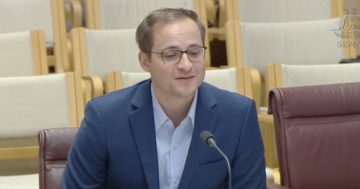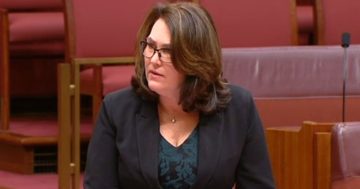
A Senate committee’s final report into the integrity of consultancies is scathing of PwC. Photo: David Murtagh.
The cross-party Senate committee examining the integrity of consultancy services to the Federal Government has come straight to the point with its final report, demanding PwC tell the whole truth about its breach of confidential Treasury information.
The Finance and Public Administration References Committee delivered its final report this week, making it clear that while the wider consultancy sector had been examined – particularly the Big Four accountancy firms – it was PricewaterhouseCoopers’ alarming behaviour that sparked the inquiry.
PwC’s ongoing refusal to follow the committee’s instructions over full disclosure leads the report’s 12 recommendations.
“The committee recommends that PwC be open and honest with the Australian Parliament and people, and with the international community, by promptly publishing accurate and detailed information about the involvement of PwC partners and personnel (including names and positions) in the breach of confidential government information,” the first recommendation states.
The 14-month inquiry was launched following the outrage expressed at revelations that PwC had leaked confidential information to its multinational clients to help them avoid tax laws the firm was helping the government establish.
Peter-John Collins, at the time a PwC partner, was subsequently sanctioned by the Tax Practitioners Board.
As more news came to light over the extent of the breach, staff at PwC Australia’s highest levels were sacked and the firm “sold off” its government contracts arm.
However, PwC has persistently refused to identify all those involved in the scandal.
The Senate committee, led by Tasmanian Liberal Richard Colbeck, comprises Coalition, Labor and Greens senators.
Its thorough inquiry has produced two progress reports before this final one was tabled in parliament.
Committee members are scathing of the grasp that exorbitantly priced external consultancies have on the Australian Public Service.
“Australia’s spending on consultancy services is proportionally greater than any other country,” they say in their final report.
“In the past two decades, the Australian Government has relied increasingly on consultants to undertake work for the Australian Public Service, with the bulk of work performed by the Big Four consulting firms (Deloitte, EY, KPMG and PwC).
“Increased use of consultants has limited the capability growth of the APS, given rise to occasions of serious conflict of interest, and been accompanied by questions about transparency.
“It has also resulted in enormous costs to the APS for work that is often opaque and, in some instances, raised genuine questions regarding value for money.”
The committee also recommends that the Department of Finance update its contract management guide to require that Australian Government contracts include a clause stating that service providers have a duty to act in the public interest when delivering work for the government.
Other recommendations include Finance improving training for procurement officers to ensure the APS actually gets value for money when engaging consultants, and that a “transfer of knowledge” from the consultant to the APS be factored into the design, management and evaluation of contracts.
Finance should also review its guidance on conflicts of interest, develop a central register for conflict breaches, and improve the usability of AusTender in the contracts process.
The report also recommends changes to the law.
It wants the Federal Parliament to legislate to establish a joint standing committee to review and approve consultancy and services contracts, similar to what the Public Works Committee does with large projects.
“The committee recommends that the government commissions the Australian Law Reform Commission, or other appropriate body, to undertake a review of the legislative frameworks and structures of partnerships in Australia with particular focus on partnerships in excess of 100 partners,” the report states.
“The review should make recommendations to provide for appropriate regulatory governance and oversight of structures of this scale.”
In a lengthy additional comments attachment to the report, the Greens have put up 22 recommendations of their own, including that no PwC-associated entity be allowed to tender for government work until after all current investigations are completed.
“The 12 recommendations set out in chapter 7 of the committee’s report offer some steps to address issues raised through this inquiry. However, the committee’s recommendations do not go far enough,” Greens Senator Barbara Pocock stated.
“They do not address the magnitude and scope of problems this inquiry has uncovered.
“Specifically, they do not address the issue of political donations by big consultants, the revolving door in and out of government, the inadequacy of penalties for PwC, the pressing need for structural reform to cap big partnerships’ size, and to address conflicts of interest and the opaque nature of big partnerships.”




















